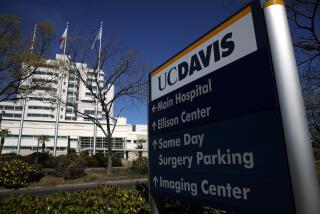California vaccination rate drops as doctors grant more exemptions. Is there a link?
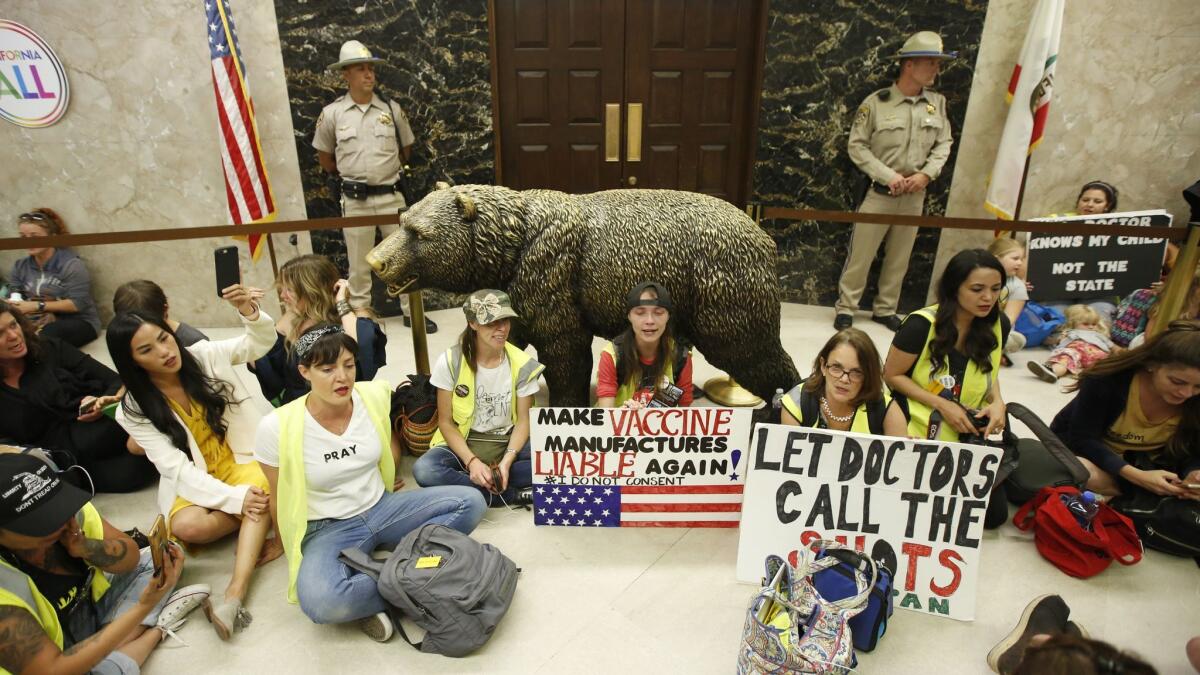
California’s kindergarten vaccination rate dropped again in the most recent school year as more parents sought permission from doctors to not immunize their children, according to new state data.
The troubling trend comes amid a national measles outbreak as well as intense debate over whether California should strengthen its school immunization laws.
California already has one of the strictest vaccination laws in the country, preventing children from skipping their shots unless a doctor says they have a medical reason to be exempt. Some health advocates fear that parents are obtaining exemptions for their children without valid medical reasons. Those advocates are now pushing lawmakers to clamp down on fraudulent exemptions.
In the school year that ended last month, 4,812 kindergartners had obtained medical exemptions from vaccines, a 70% increase from two years ago, when the vaccination law first took effect, according to data from the California Department of Public Health. The data suggest that large concentrations of medical exemptions are being granted to school children in relatively affluent parts of the state, such as Santa Cruz and Sonoma counties.
“It’s alarming that you’re having increasing numbers of medical exemptions,” said Dr. James Campbell, a member of the American Academy of Pediatrics’ infectious disease committee. “You cannot imagine that that number of additional people now have new medical problems.”
The newly released data analyzed by The Times also show:
- The kindergarten vaccination rate in California dropped to 94.8% in 2018-19 from 95.1% in 2017-18 and 95.6% the previous year.
- The school districts with the most medical exemptions were L.A. Unified, Capistrano Unified and San Diego Unified. The rate of medical exemptions in Capistrano Unified — a smaller district in Orange County — was 10 times higher than that of L.A. Unified’s.
- About 1,500 schools in California had kindergarten vaccination rates below 95%.
- At 117 schools, 10% or more of the kindergartners were not immunized because their doctors had excused them from vaccines. At 17 schools, 30% or more of the kindergarten class had medical exemptions on file.
- Overall, .9% of kindergartners had medical exemptions in 2018-19, up from .7% in 2017-18 and .5% the previous year.
Following a major measles outbreak centered at Disneyland, California passed a law in 2015 barring parents from citing their personal beliefs to avoid vaccinating their kids. California, which had become a hotbed for antivaccine sentiment, joined just two other states with such a restriction.
Three years after the law took effect, some lawmakers suspect that parents and doctors are submitting exemptions for invalid reasons. A recent Voice of San Diego investigation found that doctors penned exemptions for reasons such as “eczema” and “food allergies.”
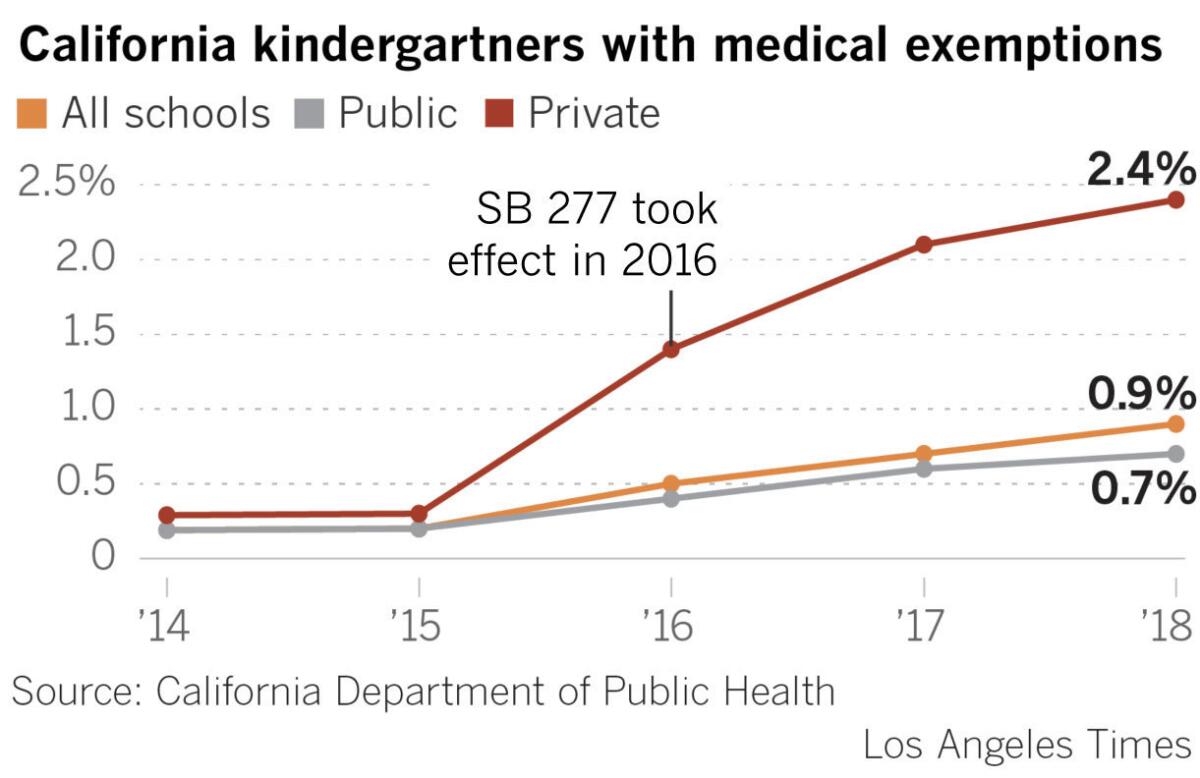
Under Senate Bill 276, the state’s health department would review and potentially reject any child’s medical exemption if they attend a school or daycare with an immunization rate of less than 95%. Physicians say that 95% of children must be immunized to prevent the spread of the most contagious diseases, such as measles.
According to the new state data, health department officials would have to review more than 1,500 schools under the law, making up approximately a quarter of all schools statewide.
“Frankly, trying to refuse vaccines when your child needs it is an issue of privilege,” said state Sen. Richard Pan (D-Sacramento), a pediatrician who wrote SB 276 as well as the original 2015 vaccination law. “What you are doing is relying on everyone else to vaccinate their child to protect yours.”
The new data are already sparking debate on whether the medical exemption spike is contributing to the state’s reduced vaccination rate. The data show that 5.2% of kindergartners were not vaccinated in 2018-19, which includes the nearly 1% of kindergarten students statewide who obtained medical exemptions.
The decrease in the overall vaccination rate is also attributable to an increase in students being home-schooled, which allows them to skip their shots, according to state data. The remaining unvaccinated children either didn’t have their required vaccines at the beginning of the school year but were expected to by the end of the year or were marked as overdue and may have been excluded from school.
Rebecca Estepp, a San Diego mother who opposes SB 276, said she thinks the focus on medical exemptions is misguided.
Estepp said that before California banned the personal belief exemption, there were more than 14,000 kindergartners with either medical or personal belief exemptions. Now, just 4,800 kindergartners have an exemption, a major drop, she said.
“There’s only a third of the exemptions there used to be, so I don’t understand this overreaching bill,” she said.
Leigh Dundas, an attorney who works with the opposition group Advocates for Physicians’ Rights, agreed that the public health department’s data show medical exemptions aren’t the driving factor in low vaccination rates.
Half of the 1,500 schools that would come under state scrutiny if SB 276 was signed into law have no medical exemptions. Instead, those schools have large rates of under-vaccinated children who enrolled in private homes schools or in off-campus independent study programs. Those students would not be affected by the bill.
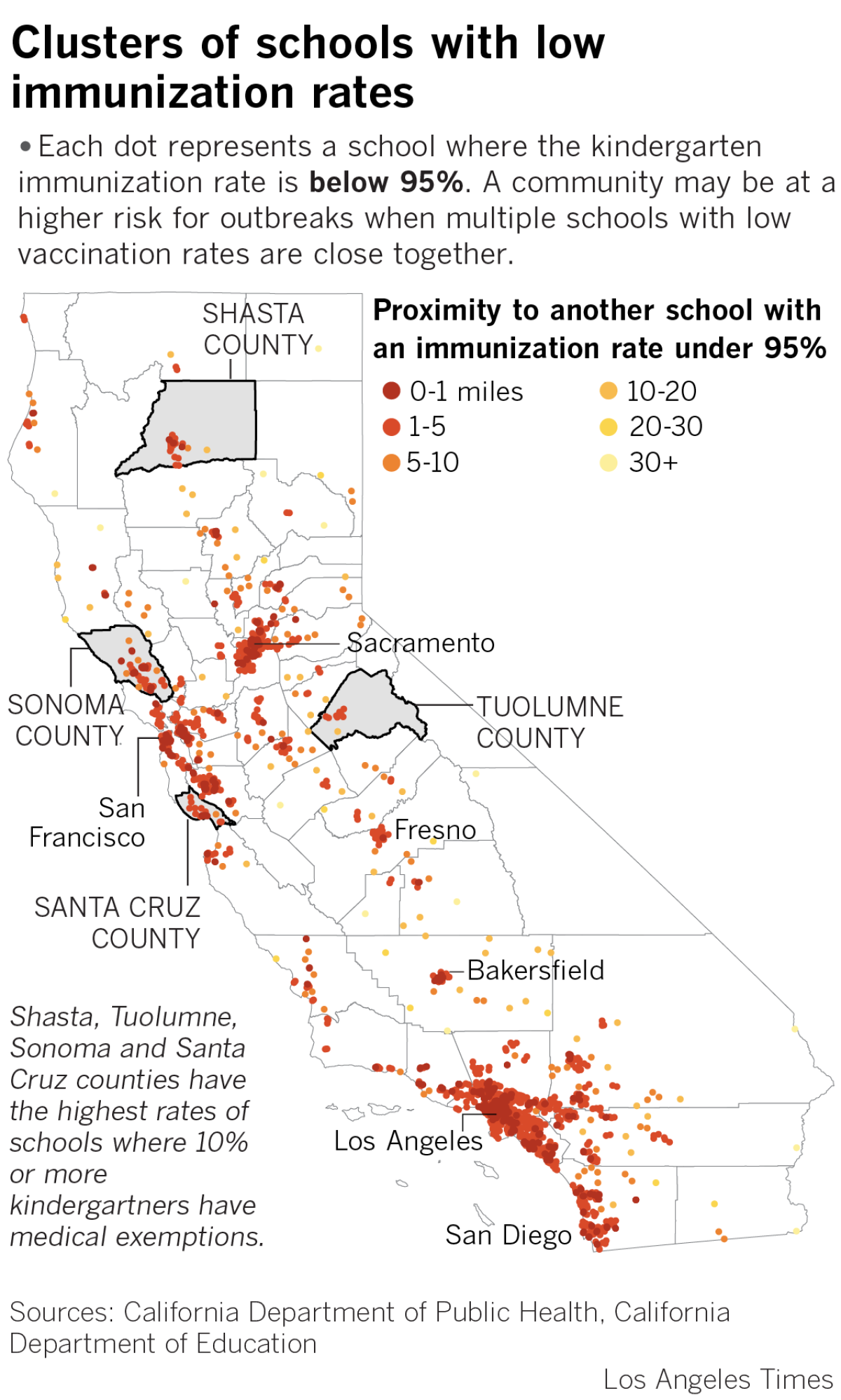
“What is the problem this legislation is trying to solve?” Dundas said. “When you are playing with less than 1%, anyone who has taken a junior high math class knows that is statistically insignificant.”
However, Campbell, a pediatrics professor at the University of Maryland School of Medicine, said the .9% would be insignificant if they were evenly distributed throughout the state. But that isn’t the case.
At 117 schools in California in the most recent school year, 10% or more of the kindergartners were not immunized because their doctors had excused them from vaccines. At 17 of those schools schools, 30% or more of the kindergartners had medical exemptions.
Typically, large numbers of immunized children in a school will protect the rare few who don’t have their shots, Campbell said. But if there are many unvaccinated people in one place, a disease like measles can rapidly jump from person to person, he said.
“If you cluster them so they’re all in the same community or the same school or daycare, as we’ve seen now with the measles outbreaks, then measles spreads,” Campbell said.
National health officials announced Monday that 1,095 people have been diagnosed with measles in 2019, in what is the country’s biggest outbreak in decades. Just 55 people in California have come down with measles this year, in part because of the state’s strict vaccination laws.
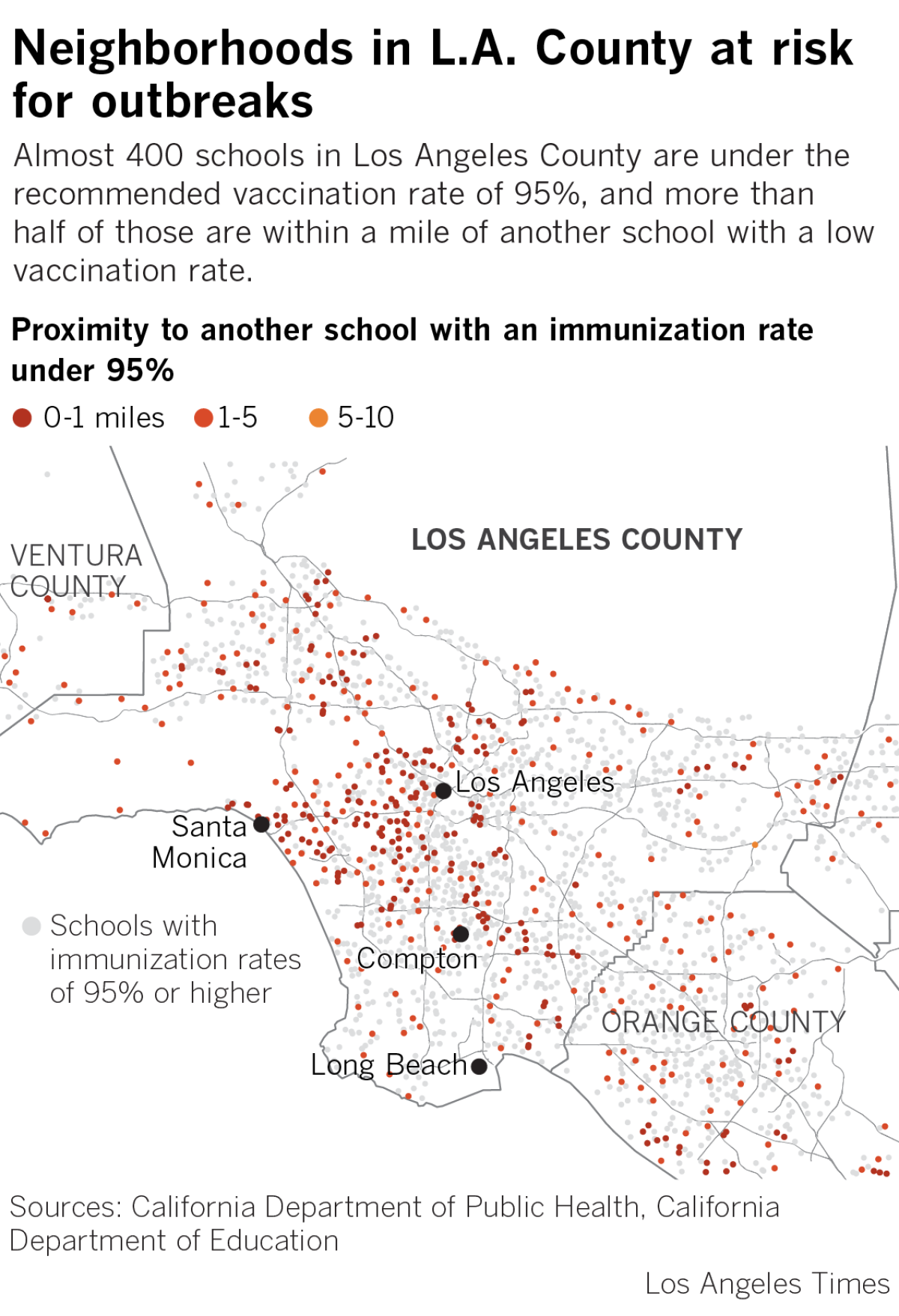
Under SB 276, California’s health department would review not only schools with low vaccination rates, but also exemptions written by doctors who have granted five or more in a year. The bill passed the Senate last month and is being considered in the Assembly, where the body’s health committee has already approved it.
Dr. Monica Asnani, a Miracle Mile pediatrician and member of the advocacy group Vaccinate California, said during her 18-year career, she has written one medical exemption, which was due to a child carrying a neurological disorder.
“I’ve asked my colleagues and they have either written none or one or two. Then you see reports of doctors with dozens, which is far outside the norm,” she said.
Asnani said that a few years ago, she heard a radio ad from a doctor who was offering patients an exemption if they visited his office and paid $180. When parents come to her seeking vaccine exemptions, she said, she explains that the concern that prompted them to seek a waiver is not a valid medical reason.
“So they go and find another doctor who will write one,” she said.
Schools with high rates of medical exemptions tend to be clustered together, The Times analysis found.
In Santa Cruz, Shasta and Sonoma Counties, about 1 in 10 schools have kindergartens where more than 10% of kids have medical exemptions. In Tuolumne County near Yosemite National Park, nearly a quarter of the schools have kindergarten classes where 10% or more of the kids have doctor’s notes excusing them from vaccines.
The state only collects data on students entering kindergarten and seventh grade, which are when immunization records are checked by school officials. The data on seventh-grade immunization rates for the 2018-19 school year have not yet been released.
Among kindergartners, schools with high medical exemptions rates tend to be Waldorf schools, which have come under scrutiny in California for their relatively low vaccination rates. Waldorf Schools practice a holistic approach to learning and are based on the philosophy of Austrian thinker Rudolf Steiner, who was critical of many aspects of medicine during his era, the late 19th and early 20th centuries.
Hannah Henry said she pulled her three children from a Waldorf school in Napa four years ago because the vaccination rate was below 50%.
Her three school-aged children were fully vaccinated at the time, but she had a toddler who was not yet fully immunized. Being on a campus with a low vaccination rate amid the 2015 measles outbreak made her concerned her toddler could contract a preventable disease. Leaving the school her family loved was difficult, she said.
“The silence and dismissal of this issue at some schools has really limited the population who can consider an alternative education like Waldorf,” Henry said. “That’s unfortunate for the school and the community. It’s a beautiful methodology and should be safe for all children.”
Vaccination data on individual schools statewide can be found at the CDPH website, https://www.shotsforschool.org/k-12/how-doing/
California kindergartens with the highest medical exemption rates:
- Yuba River Charter in Nevada County: 64%
- Muse School in Los Angeles County: 50%
- Sunridge Charter in Sonoma County: 47%
- Sebastopol Independent Charter in Sonoma County: 45%
- Live Oak Charter in Sonoma County: 43%
- Westside Waldorf School in Los Angeles County: 37%
- Coastal Grove Charter in Humboldt County: 36%
- Waldorf School of the Peninsula: 36%
- Santa Cruz Waldorf School: 34%
- Journey in Orange County: 33%
Twitter: @skarlamangla
More to Read
Sign up for Essential California
The most important California stories and recommendations in your inbox every morning.
You may occasionally receive promotional content from the Los Angeles Times.

